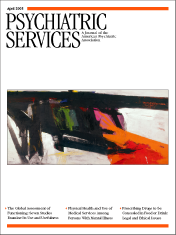The practice of surreptitious prescribing to so-called noncompliant patients is coercive and forced treatment at its most sinister. Ethical and legal questions aside, when physicians prescribe powerful neuroleptics to be hidden in the food of unsuspecting patients, the likelihood of recovery, which should be the goal of any psychiatric treatment, is diminished if not halted altogether.
In this issue of Psychiatric Services, Whittey and Devitt weigh the advantages and disadvantages of surreptitious prescribing. Proponents of surreptitious prescribing argue that covert medication administration trumps issues such as breach of trust between a physician and patient and abuse of a physician's power. Additionally, the authors cite the prevention of relapse and hospitalization as legitimizing factors. Inherent in this belief system is that medication adherence, not recovery or the ability to live a self-determined life, should be the desired outcome. Although there is a precedent for some form of surreptitious prescribing for children and persons who suffer from dementia, it is a frightening prospect that people with mental illness could be subjected to this dangerous practice.
The issue of noncompliance raises the question, "If neuroleptics and antipsychotics make people feel better, why don't people stay on them?" The standard answer is lack of insight caused by mental illness. But could it be that what patients say is true? They feel worse when taking the drugs. The side effects are horrendous and sometimes life threatening. And the side effects don't get better.
People who have a diagnosis of a severe mental illness already feel a loss of control over their lives. They feel hopeless, helpless, frightened, and sometimes angry. Research indicates that a high percentage of patients with a severe mental illness, up to 70 percent in some studies, have a history of trauma and abuse. Patients who have achieved significant recovery report many factors other than medication as key to regaining control over their lives. Trusting relationships and feeling safe with family, peers, and caregivers are often mentioned.
Conversely, patients with psychiatric disorders describe the loss of control and trust when being forcibly treated as more devastating to them than the symptoms that led them to seek treatment in the first place.
Surreptitious prescribing violates every tenet of the doctor-patient relationship and is the antithesis of recovery. Desperate but ill-advised caregivers and family members who succumb to this insidious and deceitful practice cannot possibly be doing a service to loved ones. They are party to an unimaginable and fundamental loss of trust.

